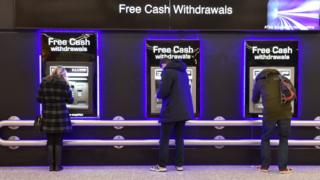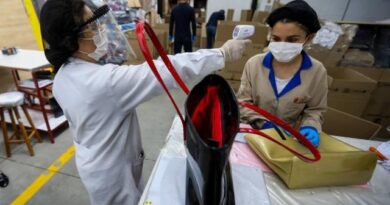More than half of all payments made by card even before coronavirus
 Image copyright Getty Images
Image copyright Getty Images More than half of all payments were made by card last year – leaving the UK «inadvertently» prepared for the coronavirus lockdown, banks say.
It was the first time debit, credit and charge cards accounted for the majority of payments, as cash fell to fewer than one in four payments, UK Finance said.
The trade body said cash withdrawals had since fallen sharply amid lockdown.
It has yet to make long-term forecasts on whether the way we pay for things will change long-term.
Campaigners and banks say cash will continue to be an option for consumers for many years.
Paying in the pub
Withdrawals at ATMs fell by two-thirds in the early weeks of the crisis before levelling out at half of normal levels.
People are buying online and, when they do go to the shops and supermarkets, they are being encouraged not to use notes and coins. The Wetherspoon pub chain, for example, has suggested customers should pay by app or by card at the bar when its doors reopen, and others could follow suit.
Previously UK Finance has said cash would be used in fewer than one in 10 transactions within a decade, but it was unclear as yet whether that prediction may accelerate as a result of changing consumer trends following the virus crisis.
Its research showed that, out of 40 billion payments made last year, about 30 billion were «spontaneous» day-to-day transactions by consumers. Overall, cards were used in 51% of transactions.
The figures showed:
- The number of contactless payments rose by 16% last year, often in supermarkets. A new limit of £45, rising from £30, has since been rushed through during the coronavirus crisis
- Some 23% of all payments were made by cash last year, down from 58% a decade earlier
- Last year, 7.4 million primarily younger people lived close to a cashless lifestyle, but 2.1 million people, often older, mainly used cash day-to-day
Some nine in 10 people had experience of shopping online, including eight in 10 older people, so a total of 48 million people bought goods and services over the internet last year.
For the first time, by the start of this year, half of the population was using mobile phones to do their banking, while 72% used online banking in some way, the research found.
Stephen Jones, chief executive of UK Finance, said the research showed many consumers had been «inadvertently» prepared for paying for things during lockdown.
«With consumers already using contactless payments and remote banking more than in previous years, these technological advances have allowed many people to shop and make payments safely from home or in store. The impact of Covid-19 may accelerate these habits for many customers,» he said.
Cash remained the second most popular way to pay last year, with the use of cheques still falling.
Mr Jones said banks were still making cash available to anyone who needed it.
Natalie Ceeney, who authored a report about the risks of moving too fast to a cashless society, said: «It’s essential that we ensure that everyone is included in our economy, and until digital payments work for everyone, we need to maintain people’s ability to access and pay with cash.»
John Howells, chief executive of Link – which oversees the UK’s cash machine network, said: «There is still almost £1.5bn being withdrawn from ATMs a week and millions of people aren’t yet ready to go cashless. What’s needed now is legislation to maintain cash for as long as it is needed.»

